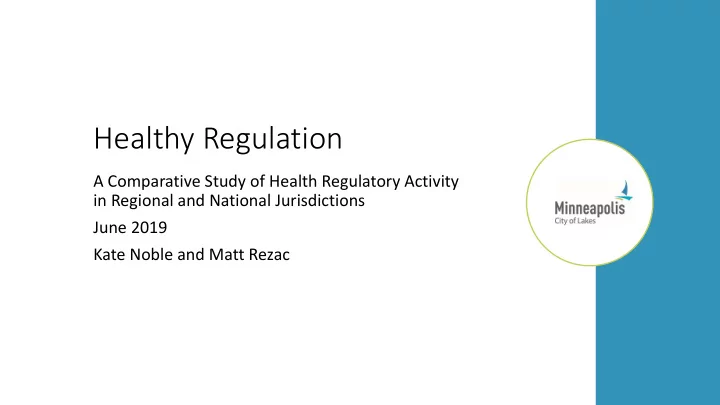

Healthy Regulation A Comparative Study of Health Regulatory Activity in Regional and National Jurisdictions June 2019 Kate Noble and Matt Rezac
Why we’re here Inform the Council’s discernment re: optimal health regulation A few concerns prompted this study • The potential for over-regulation of Minneapolis businesses • The right size of Minneapolis Environmental Health (MEH) • The gap between expenses and revenues (recovery ratios) attributable to MEH
Methods Regulation Document Review Review of MEH Records Stakeholder Interviews Informational Meetings Inspection Ride-Alongs …it didn’t take long to discover…
Problem Solution 1. Behaviors & events Reactive 2. Patterns of behavior Tactical 3. Structures that restrict & Strategic bias behavior 4. Core values and mindsets Systemic that anchor behavior Changes occur through relationships
Key finding: MEH inspection levels on par with other jurisdictions Routine inspections 12-18-24 months: the minimum level required ▪ Jurisdictions outside of Minnesota inspect up to 4X as often Re-inspections 36% of routine inspections yield a re-inspection in Minneapolis 39% is the average across jurisdictions
Key finding: MEH staffing on par with other jurisdictions Inspections Kansas City Kansas City per FPL Bloomington & Richfield Bloomington & Richfield inspectors Denver (2018) Denver Hennepin County Hennepin County Minneapolis Minneapolis Brooklyn Park Brooklyn Park St. Cloud St. Cloud St. Paul (MDA + MDH) St. Paul (total)
Key finding: Minneapolis calls violations at high rate; most are non-critical violations Total Violations per % of violations violations inspection that are non-critical Minneapolis 21,139 4.4 79% Denver 13,996 0.99 26% Seattle and King County 9127 0.36 76% St. Paul (MDA & MDH) 6510 3.9 64% St. Paul (MDH) 5225 3. 9 64% Brooklyn Park 2071 3. 1 58% St. Paul (MDA) 1285 4.8 63% St. Cloud 959 1.5 50%
Key finding: Mismatch between ELMS configuration and health regulatory data requirements On average, it takes as long to input data as it does to complete an inspection, about 90 minutes for each. Others do more in half the time.
Key finding: the Minneapolis business licensing fee schedule is… …longer, more detailed, less integrated and less user -friendly than many other jurisdictions “I never compare our fees to Minneapolis because I can't read their fee schedule – I have to call their staff and ask. I have worked in this field for 50 years! I can’t figure out the square footage at all.”
Key finding: short term event inspections used as a work-around Short term Percentage of Routine event routine that are inspections inspections special events Kansas City 1477 2829 52% Minneapolis 703 3532 20% Hennepin County 637 4700 14% Bloomington & Richfield 301 1524 20% St. Paul (MDA & MDH) 271 1322 20% Brooklyn Park 42 335 13% St. Cloud 42 467 9% Denver 23 8313 <1%
Key finding: plan review can be burdensome for business owners Must navigate city and state departments who do not always coordinate or communicate accurately Frustration = unapproved plans that halt business activity
Problem Solution 1. Behaviors & events Reactive 2. Patterns of behavior Tactical 3. Structures that restrict & Strategic bias behavior 4. Core values and mindsets Systemic that anchor behavior Changes occur through relationships
Recommendations Maintain most MEH inspections practices Improve license and fee structure and streamline administration Address ELMS and health regulation data incongruencies Address regulatory pain points ▪ Short term event inspections ▪ Plan review
Questions?
A special thanks to everyone who helped out! Business owner interviewees (Interviews conducted by the Minneapolis Small Business Team) • Tommy Beevas, Pimento Jamaican Kitchen • Robert Grace, Be Graceful Café • Maria Gutierrez, La Mexicana and La Guadalupana • Claudia Hernandez, Hamburguesas el Gordo • Julian Ocampo, Los Ocampo • Saed Wadi, World Street Kitchen, MilkJam , Lil’ Jam, Grand Catch • Toom Nguyen, Lotus Vietnamese • Abdirahman Kahin, Afro Deli • Bre Waters, Bartmann Group
A special thanks to everyone who helped out! City Staff • Al Hanson, Development Coordinator III, Minneapolis CPED • Dan Huff, Minneapolis Environmental Health Department Director • Ryan Krick, Minneapolis Environmental Health Department Supervisor • Cindy Weckwerth, Minneapolis Environmental Health Department Supervisor • Linda Roberts, Interim Manager, Minneapolis Business Licensing One-on-one meetings and health inspections ride-alongs • Kathy Loudon, Senior Health Inspector Mohamed Yusuf, Health Inspector II • Kenya Urena-Muro, Health Inspector II William Kass, Senior health inspector • Dane Huber, Health Inspector II • Kevin Keopraseuth, Health Inspector II • Graham Miller, Health Inspector II • Leslie Foreman, Community Engagement Coordinator • Mary Vang, Administrative Analyst
A special thanks to everyone who helped out! Interviewees from other jurisdictions • Greg Abel, Retail Food Specialist, Food and Drug Administration • Kim Carlton, Partnership and Workforce Development Unit Supervisor, Food, Pools, and Lodging Services Section, MN Department of Health • Jae Douglas, Environmental Health Director, Multnomah County Health Department • Duane Hudson, Supervisor, Environmental Health, Hennepin County • Naser Jouhari, Senior Public Health Manager, Kansas City, Missouri • Danica Lee, Division Director--Public Health Investigations, Denver Department of Public Health and Environment • Jeff Luedeman, Food and Feed Safety Program Manager, MDA • Jeff Martin, Environmental Health Supervisor, Multnomah County Health Department • Lynn Moore, Environmental Health Manager, City of Bloomington • Jason Newby, Code Enforcement and Public Health Management, City of Brooklyn Park • Matt O'Brien, Health Director, City of St. Cloud • Wendy Spanier, South Fields Operations Supervisor, MDH (St. Paul)
Recommend
More recommend